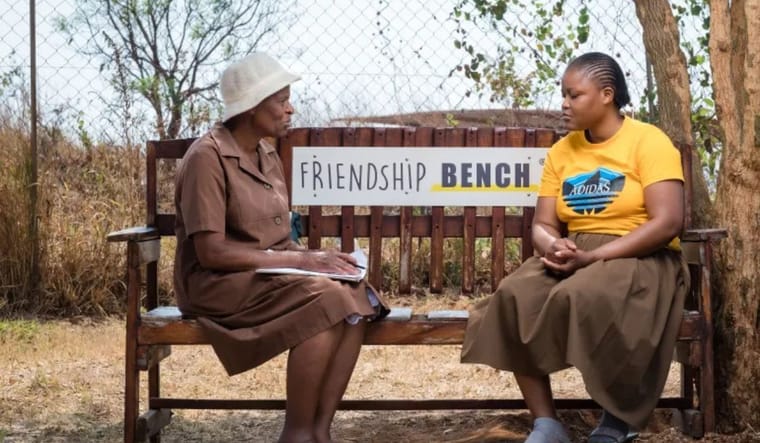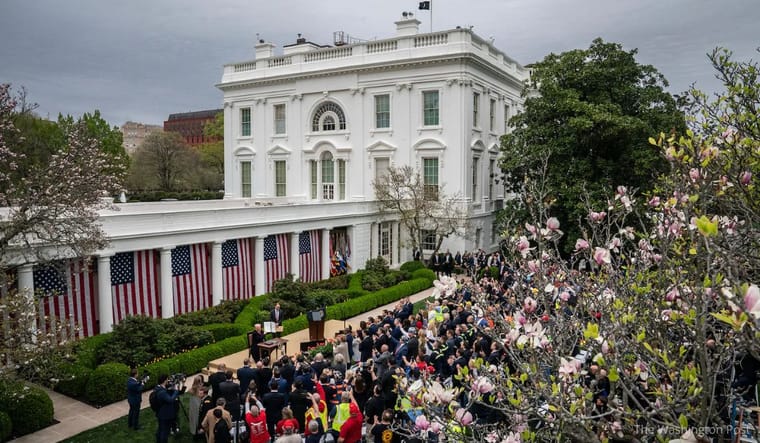Meet the Women Leading the Resistance in Afghanistan
In Afghanistan, history is beginning to rhyme. The Taliban, ousted by U.S. forces 20 years ago, are now back in control. Their new government, led exclusively by men, made clear from the outset that women would disappear from public life once again.
To be sure, the Taliban aggressors have already gone too far. Yet they also have underestimated the opposition they would meet from the women of Afghanistan along the way.
In the face of uncertainty and mounting terror, women are standing up individually and collectively to resist. They are determined to sustain human rights and adamant on preventing their exclusion from schools, parliaments, and all other spheres of public life. Who are these outspoken women, daring to protest and risking their lives?
Anisa is 25. She is an economist and activist in hiding.
Shock and depression. That’s what best describes the atmosphere of the country since the president’s flight from Kabul, Anisa says. “In a city permeated by fear of Taliban barbarism, my female colleagues and I decided to rise up.”
In August 2021, Anisa made her way to the airport in the wake of the great evacuation to witness the Western withdrawal first-hand. “I saw the Taliban in their element—the same barbarians from 25 years ago,” she says. “I did not experience the first Taliban rule, but I could put faces to the stories that I had heard based on what I saw that day. This was my personal motivation to stand up against them so that their whips will never strike a woman again.”
Within the space of 24 hours, Anisa and 300 other women came together over WhatsApp, cutting across provincial and ethnic lines. Organised and armed with banners, they made their way to the presidential palace. The demonstrators—rallying around their common demand for “work, bread, and freedom”—were soon met by rifle butts and tear gas. “A woman standing face-to-face with the Taliban can immediately recognise their true colours. One must be on the verge of insanity to do this to oneself,” Anisa explains.
I asked Anisa what she made of this risky endeavour.
“The women confronting the Taliban are educated and alert. They feel responsible for the youth: to ensure that they can go to schools guided by freedom of speech,” she told me.
Many women have already paid a high price for their courage. “In the first few days, we lost four of our colleagues in Mazar-i-Sharif; they were shot by the Taliban. They abducted 40 women who experienced horrible things in private prisons.”
Anisa has had to go into hiding. Her plea: “I beg of you women in the world, do not abandon us.”
Wafa is 33 and under house arrest.
During her political science and law studies, Wafa met a professor whose reading lists put her on the path towards activism. A book called Street, Protest, and Power finally compelled her to move from theory to action.
When I meet Wafa on Zoom, she is sitting in front of a beautiful mosaic wall. I admire the artistic display. “No, this is not my home,” she says. “I have gone into hiding at my friend’s place—and I have to speak quietly so that nobody can hear me.” Wafa belongs to the generation of women who grew up under the Taliban’s first rule in the 90s. Although she had not been allowed to attend school as a girl, she caught up, went to university, and became captivated by literature. She told me this as she smiled ear to ear.
The arrival of the “new” Taliban last summer took a whole generation of women back in time. Wafa relays the chaos, panicked crowds, and persistent noise of planes in the wake of Kabul’s fall. These not-too-distant memories fill her with sadness. Her smile fades and her focus intensifies as she talks about this moment of awakening. It was then that Wafa realized she had to link up with other women. Their first meeting took place in a Kabul coffeehouse.
The group’s first demonstration began peacefully. “We laid flowers in front of the Interior Ministry to commemorate our soldiers, who died in vain,” she told me. “All of a sudden we found ourselves surrounded by Taliban trying to disperse us with pepper spray and guns.”
Was this violence foreseeable? And why did Wafa go underground? Was she being threatened? Fellow women protestors have been kidnapped, including two of Wafa’s friends. “The Taliban are crossing every conceivable line. We are not afraid of death. However, the thought of being abducted by the Taliban—knowing what they did to the women in Mazar-i-Sharif—is harrowing.”
I ask Wafa whether she would like to remain anonymous. Her response: “My name is my identity. If you don’t have a name, then you have no drive to fight.” In light of recent developments and disappearances, however, I feel compelled to protect her identity—so, Wafa is a pseudonym. I do not want to give the Taliban more ammunition in the event of her capture.
Two weeks after our conversation, Wafa was discovered and abducted, along with twenty-eight of her fellow women activists.
Shortly thereafter, I see her again—this time on a video uploaded to Twitter. It has the markings of a forced confession tape. Wafa is seen with her head down. The street protests, as she mumbles in a strained voice, were “merely a ploy” to get a spot on an evacuation list. Meanwhile, she is back at home with her family and the Taliban are holding onto her passport.
When I first learned of Wafa’s arrest, I was reminded of what Hoda Khamosh had told me when we spoke about her own resistance journey: “Of course we are scared, but the fear of losing our dreams and rights is far greater.”
Hoda is a 25-year-old poet and activist.
She is one of the better-known faces among the new generation of women activists from Afghanistan.
In January, Hoda travelled to Oslo on the invitation of the Norwegian government to partake in the Taliban talks. She was not, however, flown in by private jet like her adversaries from the Taliban delegation; she was on the civil society ticket. Being used to standing face-to-face with the Taliban, Hoda was undeterred and brought the women’s protest straight to the negotiating table. Holding up large posters with the pictures and names of missing women, she directed her attention to the Minister of Foreign Affairs, Amir Khan Muttaqi—part of the Taliban delegation—and demanded the immediate release of her fellow activists.
After reading out the names of women who had disappeared, she turned to the Taliban delegation and asked, “Why are you locking us up in Kabul but sitting here with us in Oslo?” Hoda went on to implore the international community not to assume the role of the bystander: “If you remain silent and tolerate these criminal activities, you will make yourself complicit.”
Hoda’s intervention in Oslo has made it impossible for her to return to Afghanistan. For fear of Taliban retribution, she also asked her husband not to stay in their house while she was gone. Just in time, he managed to find refuge at a friend’s place and has since fled to Pakistan. While Hoda does not want to seek asylum, returning to Kabul is not an option. She lives in limbo.
Simi is 24 and lives at home.
From a very young age, Simi’s father urged her to study law to so that she could one day defend the rights of women across Afghanistan.
Subversive methods of resistance have become the preferred approach by Simi, who worked at the women’s ministry in Badakhshan province until its dissolution. She did not leave empty-handed; she still has her network and contacts. Since street protests have become too dangerous, Simi and her group have now brought the demonstrations from the streets to their homes. They are putting their demands on posters, taking snapshots, and sharing them with contacts and followers online. The content is spreading like wildfire over social media.
The Taliban soon came knocking at Simi’s door. Yet her father succeeded in shielding her.
Simi also has a message for the West: “Don’t forget the women in Afghanistan,” she says. “These are the very women on whose behalf international organizations and political representatives pocketed a lot of money. Now they are having a nice time somewhere in the West and we are here, bearing the brunt of their betrayal.”
Mariam is a 26-year-old sociologist, activist, and avid reader of feminist literature.
She is another member of the silent women’s protest movement. Mariam was raised in a progressive household and is still trying to wrap her head around the fact that she is now destined to relive her mother’s fate of an existence under Taliban rule.
“This Taliban takeover pushed our mental wellbeing to a depth I did not even know existed,” she says.
Like many of her peers, Mariam is shifting towards long-term and more subtle forms of protest. She has founded a book club, now 30 women strong. “This is how we will remain visible; we didn’t want society to get used to not seeing women anymore,” she says. They meet once a week, read texts by Heinrich Böll, Simone de Beauvoir, and Oriana Fallaci, to name a few. She is convinced that “books will clear the roadblocks that the Taliban have put in our paths.”
Afghanistan’s nascent democracy has been betrayed. This seems to be the consensus among the many women activists with whom I have been speaking since August of last year—women who have dared to use their voices and wave their banners to challenge the new Taliban.
Women are the face of Afghanistan’s resistance. They are the conscience of our global community. Their fight is our fight.
*This article is an adapted English language version of an article published on 27 March 2022 in the Sunday edition of the Austrian daily newspaper ‘Die Presse’. Translation from German into English by Rafael Kropiunigg.
Please note that we may receive affiliate commissions from the sales of linked products.



